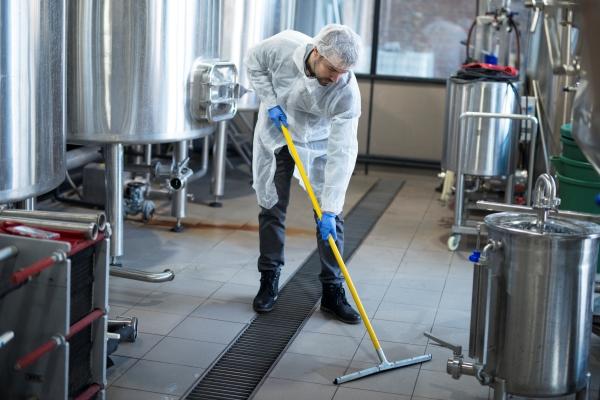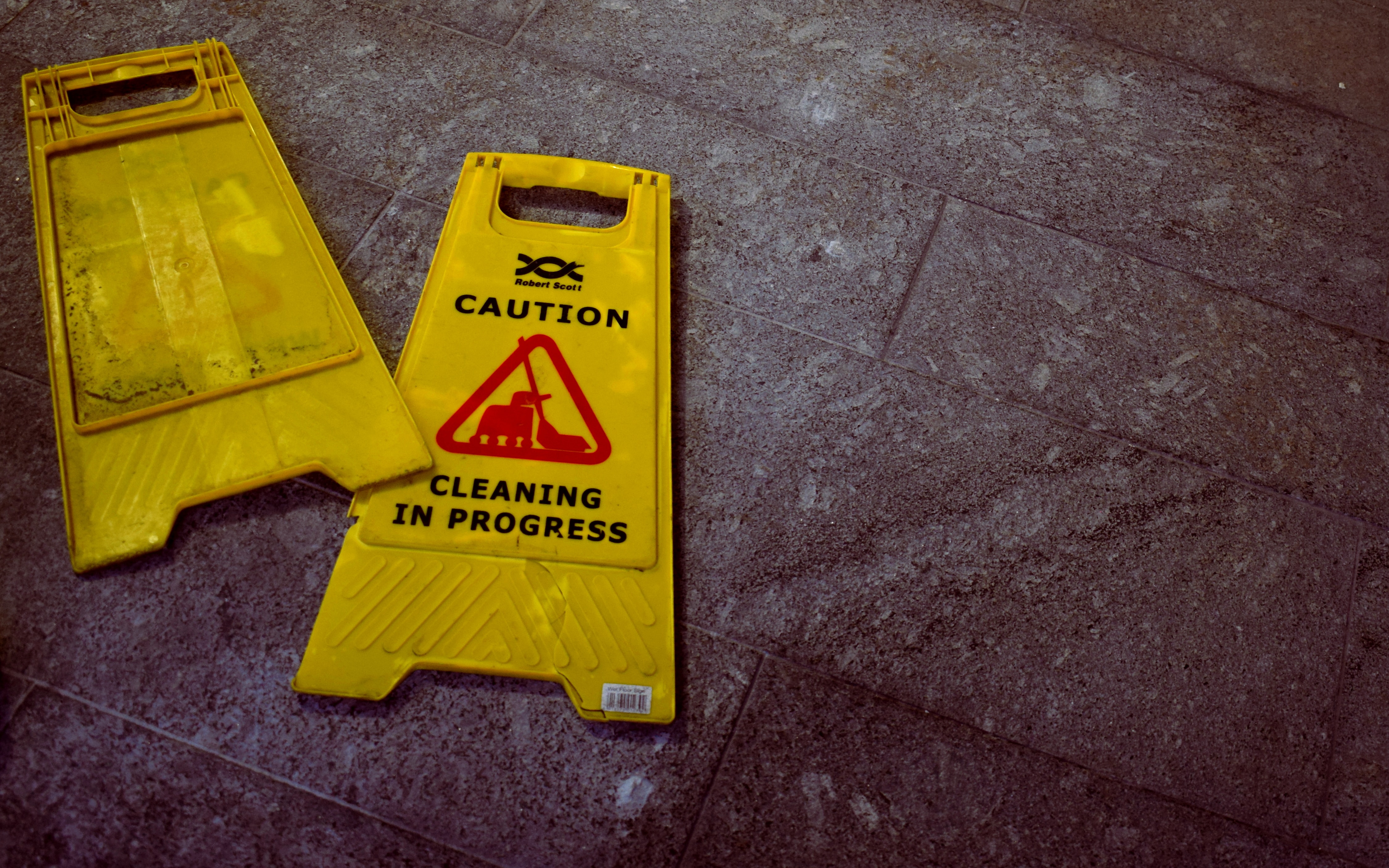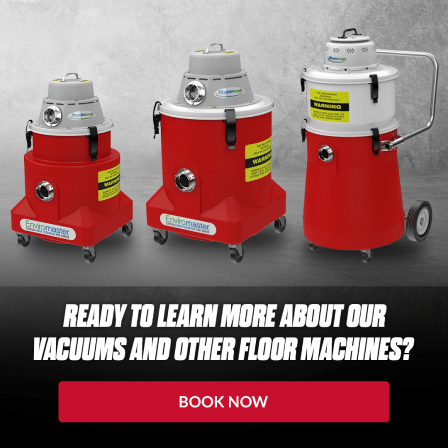What Is Industrial Cleaning?
Industrial cleaning is the process of removing contaminants from industrial surfaces. It involves the thorough cleaning and sanitization of various industrial settings such as factories, warehouses, production facilities, and manufacturing plants.
Industrial cleaning plays a crucial role in maintaining a safe and productive working environment. While it may seem like a daunting task, using the right tools and procedures can make your industrial cleaning project a success.
Using proper cleaning methods can help reduce maintenance costs, boost energy efficiency, and even improve the company's image. In this guide, we'll walk you through the process of industrial cleaning and explain the different types of industrial cleaning.

Industrial Cleaning
Industrial cleaning includes cleaning manufacturing spaces, hospitals, office buildings, and other large spaces.
These spaces can have many uses, such as pharmaceutical manufacturing, food production, oil refining, and even research and development.
These spaces are often filled with dust, dirt, debris, and other particles. The constant flow of equipment, machines, and people can make these spaces dirty and unsafe.
Industrial cleaning involves removing contaminants from these spaces and maintaining a clean environment. These contaminants may include dirt, grease, oil, chemicals, and other particles affecting the equipment.
HOW DOES INDUSTRIAL CLEANING WORK?
An industrial cleaning contractor uses a variety of methods to clean industrial spaces. These methods can include manual cleaning, power washing, steam cleaning, mold removal, etc. Industrial cleaning companies will also use specialized equipment to clean hard-to-reach areas.
Safety equipment, such as gloves, goggles, and respirators, are often used to protect workers from exposure to hazardous chemicals and debris.
BENEFITS OF INDUSTRIAL CLEANING
There are many benefits of industrial cleaning, including:
- Reduce the risk of accidents
- Improve company image
- Reduce maintenance costs
- Boost energy efficiency
- Improve air quality
During high economic growth periods, many companies and manufacturers expand their operations.
The plastics industry is one of the fastest-growing industries in the United States. These high-growth periods mean more production and an increase in both people and equipment.
As a result, the space where the production takes place can get clogged with dirt and debris. This reduces efficiency and increases wear on equipment due to increased friction, which causes costly downtime and decreases profits.
Another critical benefit of industrial cleaning is improved employee safety. Industrial settings are filled with hazards. These hazards could include sharp edges, slippery surfaces, hot surfaces, electrical hazards, etc.
If employees are working in these spaces, they pose a risk to themselves and the equipment they're servicing. By cleaning these spaces, hazardous elements are removed from the equipment to promote a safe work environment.
TYPES OF INDUSTRIAL CLEANING
There are several types of industrial cleaning: cleaning for aesthetics and cleaning for health and safety. These types of cleaning take different routes to get the job done right.
AESTHETIC CLEANING
This type of cleaning is used to make an area look cleaner. Areas such as lobbies, hallways, staircases, and common areas are often cleaned with aesthetic cleaning.
During this type of cleaning, the goal is to remove unwanted dirt and stains and make the area look clean again.
HEALTH AND SAFETY CLEANING
This type of industrial cleaning is used to make an area safe. Activities such as sanitizing equipment, removing hazards, removing contamination, and more are common ways to clean for health and safety.
During health and safety cleans, there is also an emphasis on making equipment look clean again.
GENERAL CLEANING
This type of cleaning includes sweeping, mopping, and dusting. It removes general dirt and debris from surfaces.
DEEP CLEANING
Deep cleaning removes more stubborn dirt and grime from surfaces. It may require power washers, steam cleaners, or other heavy-duty equipment.
SPECIALIZED CLEANING
This type of cleaning addresses specific needs such as handling hazardous materials, dealing with fire damage, or cleaning delicate electronics.
Industrial cleaning is an integral part of any business. A clean and safe work environment is crucial for maintaining a productive workforce.
WHAT'S THE DIFFERENCE BETWEEN INDUSTRIAL CLEANING AND BUILDING CLEANING?
Building cleaning focuses on making the interior of your building look clean. These cleanings often involve cleaning carpets, removing stains, vacuuming the floor, etc. Building cleaning is usually a seasonal job at the end of the year.
Industrial cleaning focuses on making the environment of your building safe and clean. Your building may look clean during industrial cleaning, but it may need to be more secure.
Industrial cleaning companies make sure dangerous items are removed, equipment is free of contaminants, and the environment is free of dust and dirt. Industrial cleaning is often a year-round job, depending on where you work.
WHICH TOOLS ARE NECESSARY FOR INDUSTRIAL CLEANING?
- Dust Extraction Machine - This machine helps large clean areas, such as floors or ceilings. It takes dust, dirt, oil, and other particles and pulls them up from the ground or ceiling with a vacuum.
- HEPA Vacuum - Vacuums with a high-efficiency particle air (HEPA) filter are essential for industrial cleaning. These vacuums help clean more extensive areas, such as air ducts and air conditioning units. They also help prevent bacteria, viruses, and other infections.
- Brooms - Brooms help with sweeping and make it easier to clean the space. They have a handle and head, as well as bristles.
- Buckets - Bucket liners are often used in high-traffic areas. They help keep floors, carpets, and other hard surfaces clean.
- Spray Bottles - Spray bottles are helpful in cleaning the inside and outside of equipment. For example, they can help clean inside large machines and equipment, as well as large outside machines, such as buildings or oil refineries.
- Rubber Gloves - Rubber gloves help protect your hands when cleaning equipment and provide a safer work environment. They also prevent fingerprints on equipment, helping you maintain a professional image.
- Respirator Masks - Industrial cleaning often involves using tools and chemicals that can affect your health. You need to protect yourself from injury. A respirator mask effectively blocks harmful gasses, particles, and dust from entering your mouth, nose, and lungs.
HOW TO CREATE AN EFFECTIVE INDUSTRIAL CLEANING PLAN
CLEANING FREQUENCY
What is the optimal cleaning frequency? This cleaning frequency is the amount of time between cleans. It could be once a year or every 2 months.
A good rule of thumb is to clean at least once a year. However, the best cleaning frequency is once every 6 months. During these cleans, check your equipment, clean the inside of your building, remove dirt and stains, and make sure everything is working.
EQUIPMENT INSPECTION
How often do you inspect your equipment? This is a key step in maintaining your equipment and ensuring it's running at full capacity. Regular equipment inspections are crucial for identifying any issues, preventing breakdowns, and optimizing performance.
When conducting equipment inspections, start by visually examining the machines. Look for any signs of wear, loose parts, or accumulation of dirt and debris. Inspect the moving components, belts, filters, and lubrication points to ensure they are in good condition.
In addition to visual inspection, it's important to perform functional tests to check the equipment's performance. Run the machines and observe their operation. Listen for any unusual noises or vibrations that could indicate a problem.
If you notice any issues or abnormalities during the inspection, take prompt action. Clean away any dirt or debris that may be affecting the equipment's functionality. Tighten loose parts or replace worn-out components as needed. Regularly following an equipment inspection schedule will help prevent unexpected downtime and ensure smooth and efficient industrial processes..jpg?width=4272&height=2848&name=nino-maghradze-BUXdQh53eis-unsplash%20(1).jpg)
CLEANING ROUTINE
What is your cleaning routine like? What are you doing when you clean? There are three main steps in any cleaning routine: cleaning, disinfection, and deodorization.
During the cleaning phase, you focus on removing dirt, dust, and grime from surfaces. This involves using appropriate cleaning tools such as brooms, mops, and buckets. For example, you can sweep the floors and walls to eliminate loose debris and then mop them to achieve a thorough clean.
Once the cleaning step is complete, it's time to move on to disinfection. Disinfection involves using disinfectant sprays or wipes to kill germs and bacteria on surfaces. Pay special attention to frequently touched areas, such as doorknobs and countertops, to make sure that they are effectively disinfected.
After disinfection, deodorization can be performed to eliminate unpleasant odors. This can be achieved by using air fresheners, odor-absorbing substances, or ensuring proper ventilation in the area.
Remember, it's essential to follow appropriate safety guidelines and use suitable cleaning products for each task. Regularly assessing and adjusting your cleaning routine based on specific needs and requirements will help maintain a clean and hygienic environment.
STEPS FOR A SUCCESSFUL INDUSTRIAL CLEANING PLAN
- Determine your cleaning needs: When drawing up an industrial cleaning plan, you need to know your cleaning needs. What are they, and what are they not getting done? What are your goals, and what's preventing you from achieving them?
- Create a cleaning plan: Once you have a better idea of what needs to be done, create a cleaning plan. This plan should include your cleaning schedule, equipment used, equipment cleaned, frequency of cleaning, and any other relevant information.
- Monitor your cleaning results: Once the cleaning plan is in place, monitor the results. How well is your industrial cleaning plan working? Are your results better than before? Are your employees and equipment safer? Are there fewer maintenance costs? If not, make changes to your plan until you are satisfied with the results.
- Maintain your industrial cleaning plan: After you're happy with the results of your industrial cleaning plan, it's crucial to maintain it. This means sticking to the schedule, using the right equipment and products, and monitoring the results regularly.
WHO SHOULD DO INDUSTRIAL CLEANING?
Industrial cleaning is a specialized task that is best left to professionals. It requires expertise, appropriate equipment, and knowledge to ensure safe and effective cleaning of industrial areas.
If you are unsure about your ability to handle industrial cleaning on your own, it is highly recommended to hire a professional industrial cleaning company. These experts have the necessary skills and experience to assess your unique cleaning needs. They can create a customized cleaning plan tailored to your specific requirements, ensuring that the industrial space is cleaned thoroughly and efficiently. By entrusting the task to professionals, you can have peace of mind knowing that the job will be done properly, while you can focus on your core business operations.
INDUSTRIAL CLEANING SERVICES
Industrial cleaning companies offer a wide range of services to cater to various needs. Whether you require janitorial services, asbestos removal, or one-time deep cleans, these companies are equipped to assist you.
Additionally, they can provide regular maintenance cleaning for your industrial facilities, ensuring a clean and safe working environment.
In addition to these services, some industrial cleaning companies specialize in other professional areas such as waste management, environmental services, and even equipment rental, offering comprehensive solutions to industrial cleaning needs.
When selecting an industrial cleaning service provider, it's crucial to consider their experience and reputation. Look for a company that has a proven track record of delivering high-quality services. Also, it's essential for you to find a company that offers the specific industrial plant cleaning services you need, all within a budget that suits your financial capabilities.
FINAL WORDS
Having an effective industrial cleaning plan is essential for businesses utilizing industrial equipment. It not only ensures the cleanliness and optimal performance of your equipment but also plays a vital role in preventing injuries and accidents.
To create a successful industrial cleaning plan, it is crucial to assess your specific cleaning needs, establish a regular cleaning schedule, utilize appropriate equipment and cleaning products, and consistently monitor the outcomes. By following these steps, you can develop an efficient and tailored industrial cleaning plan that will contribute to the smooth operation of your business. Remember, regular maintenance and cleanliness are key to maintaining a safe and productive industrial environment.









0 comments